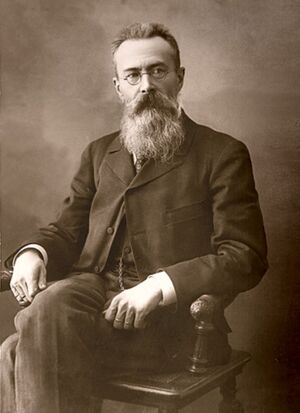Nikolay Rimsky-Korsakov
Russian composer, teacher, conductor and music critic (b. 6/18 March 1844 in Tikhvin; d. 8/21 June 1908 in Lyubensk, near Luga), born Nikolay Andreyevich Rimsky-Korsakov (Николай Андреевич Римский-Корсаков).
Tchaikovsky and Rimsky-Korsakov
After studying at the Imperial Naval College in Saint Petersburg, Rimsky-Korsakov enrolled in the Russian Navy in 1862, but his musical interests began to develop the previous year, after a meeting with Mily Balakirev. Through Balakirev he met the other nationalist composers who became "The Mighty Handful" (Могучая Кучка) or "The Five", and also became friendly with Tchaikovsky.
In 1871, he became professor of orchestration and composition at the Saint Petersburg Conservatory, and the next year he married Nadezhda Purgold (1848–1919), who was also a pianist and composer. Together they had seven children: Mikhail (1873–1951), Sofia (1875–1943), Andrey (1878–1940), Vladimir (1882–1970), Nadezhda (1884–1971), Mariya (1888–1893), and Svyatoslav (1889–1890).
Rimsky-Korsakov's reputation continued to grow, and over the next few years he became Inspector of the Navy Chorus (1873–1884), director and conductor of the Free Music School (1874–1881), assistant director of the Imperial Chapel Choir (1883–1894), and conductor of the Russian Symphonic Concerts in Saint Petersburg (1886–1890). In addition to numerous compositions, he was also the author of A Practical Manual of Harmony (Практический учебник гармонии), and memoirs A Chronicle of My Musical Life (Летопись моей музыкальной жизни), and various music review articles.
Of Rimsky-Korsakov's orchestral works Tchaikovsky was particularly taken by the Capriccio Espagnol, and after hearing it for the first time in 1887, he rushed off to buy a laurel wreath and presented it to the composer, to whom he later wrote: "Your Spanish Capriccio is a colossal masterpiece of instrumentation, and you can confidently consider yourself the greatest of all contemporary masters" [1]. Tchaikovsky also admired the operas May Night (1879) and The Snow Maiden (1881).
Following his support for student protesters in 1905, Rimsky-Korsakov was removed from his position at the Saint Petersburg Conservatory, only to be reinstated after protests from staff and students. He died of heart failure on 8/21 June 1908 at Lyubensk, aged 64.
In 1870, Rimsky-Korsakov dedicated his song Where Thou Art, My Thought Flies to Thee (No. 1 of the Six Songs, Op. 8) to Tchaikovsky, who returned the compliment with his song Wait — No. 2 of the Six Romances, Op. 16.
After his successful concert tour to Odessa in January 1893, Tchaikovsky urged the city's branch of the Russian Musical Society to invite Rimsky-Korsakov there for the 1893/94 season [2]. On 5/17 February 1894, Rimsky-Korsakov conducted a concert in Odessa in memory of Tchaikovsky, which featured the Symphony No. 3, the Piano Concerto No. 1, and the overture-fantasia Romeo and Juliet. Like the late Tchaikovsky, he also gave a concert to raise funds for the orchestra musicians of the Odessa opera-house at which he conducted the Suite from The Nutcracker ballet.
Dedications
Tchaikovsky dedicated his song Wait — No. 2 of the Six Romances, Op. 16 (1872–73) — to Nikolay Rimsky-Korsakov.
Correspondence with Tchaikovsky
18 letters from Tchaikovsky to Nikolay Rimsky-Korsakov have survived, dating from 1873 to 1891, all of which have been translated into English on this website:
- Letter 300 – 21 April/3 May 1873, from Moscow
- Letter 361 – 13/25 September 1874, from Moscow
- Letter 383 – 4/16 January 1875, from Moscow
- Letter 401 – 18/30 May 1875, from Moscow
- Letter 412 – 10/22 September 1875, from Moscow
- Letter 417 – 12/24 November 1875, from Moscow
- Letter 493 – 7/19 September 1876, from Moscow
- Letter 502 – 29 September/11 October 1876, from Moscow
- Letter 2679 – 6/18 April 1885, from Maydanovo
- Letter 2873 – 30 January/11 February 1886, from Maydanovo
- Letter 3047 – 17/29 September 1886, from Moscow
- Letter 3074 – 11/23 October 1886, from Maydanovo
- Letter 3393 – 30 October/11 November 1887, from Saint Petersburg
- Letter 3515 – 8/20 March 1888, from London
- Letter 3944 – 1/13 October 1889, from Moscow
- Letter 3951 – 5/17 October 1889, from Moscow
- Letter 4303 – 15/27 January 1891, from Frolovskoye
- Letter 4307 – 17/29 January 1891, from Frolovskoye
18 letters from Rimsky-Korsakov to Tchaikovsky have survived, dating from 1868 to 1891, of which 15 are preserved in the Tchaikovsky State Memorial Musical Museum-Reserve at Klin (a4, Nos. 3806–3820), and 3 are in the Russian State Archive of Literature and Art in Moscow.
Bibliography
- Чайковский и Римский-Корсаков. Опыт сравнения композитор-современников (1910)
- Из переписки П. И. Чайковского (1940)
- Tchaikovsky on The Five (1940)
- Переписка П. И. Чайковского и Н. А. Римского-Корсакова (1945)
- Автографы Чайковского и Римского-Корсакова (1946)
- Tchaikovsky on The Five (1969)
- Переписка Н. А. Римского-Корсакова с П. И. Чайковским (1868-1891) (1970)
- Nationalism, modernism and personal rivalry in nineteenth-century Russian music (1981)
- Римский-Корсаков и Чайковский (1989)
- Čajkovskij und das Mächtige Häuflein (1995)
- Глинка, Чайковский, Римский-Корсаков, Стравинский (2000)
- Der Musikkritiker P. I. Čajkovskij (2002)
- Russian Christmas (2004)
- Издания сочинений Н. А. Римского-Корсакова в личной библиотеке П. И. Чайковского (2008)
External Links
Notes and References
- ↑ Letter 3393 to Nikolay Rimsky-Korsakov, 30 October/11 November 1887. See also the memoirs of Alina Bryullova in Воспоминания о П. И. Чайковском (1980), p. 116; as well as the memoirs of Nikolay Kashkin, as quoted in Tchaikovsky remembered (1993), p. 195–196: "He was for a very long while inseparable from the score of Rimsky-Korsakov's Spanish Capriccio, in which the novelty and brilliance of the orchestral effects captivated him".
- ↑ See Letter 4936 to Lev Kupernik, 17/29 May 1893.

